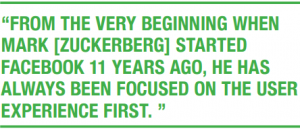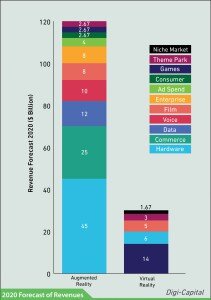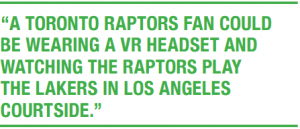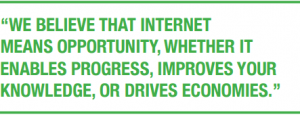Interview: Jordan Banks
The Ivey Business Review is a student publication conceived, designed and managed by Honors Business Administration students at the Ivey Business School.
Jordan Banks, Managing Director, Facebook Canada
Banks has been with Facebook since 2010. Prior to Facebook, Jordan was Chief Executive Officer at JumpTV, responsible for developing the overall strategy as well as day-to-day operation. He also served as the Managing Director of eBay Canada for seven years, where he was involved in the launch of eBay Canada in 2000. His earlier career began as an Associate at Goodmans LLP and NHL Players’ Association. Jordan has completed his bachelor degree at Western University and continued to complete his LLB at York University Osgoode Hall Law School.
About Facebook
Facebook, Inc. is a social networking service and website with the goal of connecting the planet. Its website and supplementary social media apps and platforms allows people to communicate with their family, friends, and coworkers. The company offers advertisers a combination of reach, relevance, social context, and engagement to enhance the value of their ads. Facebook was founded by Mark Zuckerberg, Dustin Moskovitz, Chris Hughes, Andrew McCollum and Eduardo Saverin on February 4, 2004 and is headquartered in Menlo Park, CA.
IBR: Have you experienced any common challenges building up the Canadian operations of American-based businesses?
JB: There are consistencies when trying to build out the Canadian subsidiary of a US parent. First, there is no inherent understanding in the US of how complicated and unique the Canadian market is. Whether those are communication or buying behaviors, these big differences need to be accommodated. When starting up a Canadian subsidiary, you must ensure the US headquarters understands the nuances and differences in the Canadian market and support a complementary go-to market strategy.
Secondly, it is important to become relevant in Canada and integrate the company into the fabric of Canadian society. Examples of this include working with political parties and nonprofits, or ensuring local volunteerism from your employees. Becoming relevant, important, and additive to the Canadian market are extremely important.
IBR: When integrating new platforms, how does Facebook balance user experience and effective monetization?
JB: From the very beginning when Mark [Zuckerberg] started Facebook 11 years ago, he has always been focused on the user experience first. If you have a great product that people ultimately want to use and that product is scalable, good and responsible - monetization will follow.
Facebook has certainly hit that mark. We have about 1B people around the world using Facebook every day. When you focus on Canada, 1 in every 4 minutes that is spent on mobile internet is on Facebook or Instagram.
IBR: Can you elaborate on how similar services across Facebook’s portfolio (i.e. Messenger and WhatsApp, Instagram and Facebook Photos) are complementary rather than conflicting?
JB: Our mission at Facebook is to make the world more open and connected. By having a family of complementary apps, we will do that in a much more profound and fundamental way than if we had just one app. All of the different apps and services are designed to allow people to share whatever they want, whenever they want, with the different sets of people and the organizations that they care most about. That’s going to continue over time and people are going to share more rich content at an increased frequency. We need to ensure that we are developing new tools that different sets of people want to use to help facilitate that kind of expression.
IBR: What specific limitations does Facebook experience running on another company’s operating system such as iOS or Android?
JB: There are limitations, but there are more positive elements. Google with Android, or Apple with iOS, sometimes look at Facebook as a friend and other times as a competitor. We don’t control the experience within the operating system, so we need to ensure that they allow Facebook and all of our apps to be freely downloaded and freely engaged on all devices using those operating systems. While we are partners with Apple and Google in a number of different ways, it is a risk, but not one we think about too often.
IBR: How will Virtual Reality (VR) change the way we consume content or communicate with others?
JB: From the very beginning, we didn’t look at Oculus as only a foray into hardware investments. Overtime, there have been a variety of competing platforms that change the way society functions, starting with the PC, the internet, and now mobile. We fundamentally believe that VR could be the next big computing platform but could be even bigger with an active ecosystem that we would develop.
When you think of the practical applications of VR, they are quite profound. A student in Delhi could be having a sensory experience of being in a classroom at Harvard Business School. A Toronto Raptors fan could be wearing a VR headset and watching the Raptors play the Lakers in Los Angeles courtside. You could experience the Seven Wonders of the World, you could visit a doctor, all from the comfort of your own home using VR. When we think about sharing more important content with the people who are most meaningful to you, this could be an important platform through which to do it.
IBR: To implement and monetize such a wide range of content, scale is likely necessary. How do you ensure Oculus gets in the hands of the masses and not just the hardcore gamers it currently appeals to?
JB: Affordability and accessibility is the first issue. Gamers generally by virtue of the consoles and hardware they are using are willing to pay more for things to enhance their experience. However, in September, we announced the availability of a consumer Oculus Gear VR unit for $99. At that price point, VR will now be available to anybody, not just gamers.
The second thing is developing an ecosystem offering different content experience outside of the gaming world, with the hardware. Facebook has got one step closer to that recently via the 360 degree video units that play in your newsfeed. Facebook has partnered with content producers, like BuzzFeed, GoPro, and the Star Wars franchise, to produce this content. Today, all Facebook users can experience the basis of VR in their newsfeed without having to pay a dollar, put on goggles, or do anything that will alter their experience. As this content becomes easier to use, more accessible, and more prominent within newsfeed, VR has the potential to become ubiquitous in short order.
IBR: Because Mark Zuckerberg mentioned that the VR headset might be the last device you may ever need to buy, how much of Facebook’s future success is based on VR?
JB: We’re certainly not reliant on it, but it’s also not disconnected. All of the Facebook properties are attempting to contribute to a richer sharing experience. We think Oculus is a way that people will share in the future that will add to the richness of sharing, but it won’t be alone in that endeavor. We will have lots of different options to share, including our current family of apps and services. Regardless of the specific Facebook platform that people share with, the decision will be made based on consumer preferences. Some content will evolve to work well for certain platforms, so it is ultimately a portfolio play.
IBR: Some analysts have suggested that Augmented Reality will outpace Virtual Reality in the coming years. Considering Microsoft is already demoing its HoloLens and Google is involved with Magic Leap, how fast does Facebook need to get into the space if it’s expected to grow that quickly?
JB: One of our core principles at Facebook is to “Move Fast and Break Things”. That is true for almost everything we do, in the most positive sense of the word “break”. If we decide that this is an area that will increase the richness of sharing and will ensure that you are connecting and having great experiences with the people who matter to you most, we will move unbelievably quickly and be incredibly aggressive.
IBR: How will M help to monetize messenger, if at all?
JB: We don’t make money from M right now. Current attempts at monetizing Messenger can be seen through beta’s we are running around businesses on Messenger. We have some partners in Zulily and Everlane. We are at the earliest stages of trying to figure out how we use Messenger to improve the interactions and communications between consumers and business, and as a result of that, allow for commercial opportunity. M, by definition, is the bridge between consumers and businesses. It is the most public and the most well developed product in the AI space for Facebook right now.
IBR: Is M an advent of a shift in all of Facebook’s products using Artifical Intelligence?
JB: One of the things we do very well at Facebook is test and iterate. So I would characterize M as “a test”. We will make sure that whatever is going well, in the sense of delighting both consumers and businesses, we will do more of. Whatever isn’t doing that, we will stop. This viewpoint is not just important for M in Messenger, but everything we do at Facebook.
IBR: Mark Zuckerberg once compared Facebook to a utility, a service which people need to keep using. Is individually targeted advertising core to this vision, or is it only meant to help fund the Facebook services everyone will need?
JB: Definitely the latter. When we went public in May of 2012, Mark wrote this incredible letter, talking about his philosophy on why he created Facebook and the way he wants to run Facebook into the foreseeable future. What he effectively said was that Facebook was not originally created to be a company. It was created to be part of a social mission to make the world more connected.
IBR: Internet.org has the potential to be an actual utility and offers growth potential for many Facebook products. What are the biggest challenges of scaling Internet.org?
JB: We are laser-focused right now in bringing internet to the rest of the world. Over the last decade we have connected over 1B people. We want to make sure that we are doing something profound to help the 4 billion people who are unconnected to get connected in short order. By using Internet.org and the Free Basics app by Facebook, we have now added another billion people in over 30 countries who have the opportunity to be connected.
But there are certainly obstacles. The first is financial; can you afford it and do you know it exists? To change that, we now offer a bucket of free services around things like employment, education, healthcare, and women equality that is free and available to everybody in a country that has Internet.org infrastructure. These people will be able to access all of those elements without ever paying a penny for data.
The second obstacle is the technical components of connectivity and the infrastructure required. We have a specific team at Facebook called the Connectivity Lab who are working on effective and efficient forms of connectivity for the most remote places in the world by using innovations like aircrafts and satellites. Our goal is that in the near future there won’t be one human on the planet who wants connectivity who can’t get it because they couldn’t afford it, they didn’t know it existed, or the infrastructure in their community didn’t allow them to do that.
IBR: With competing infrastructure projects from Google and SpaceX, do you believe the internet service provider (ISP) space will be vastly different in the next 10 years?
JB: Right now we are only focused on ensuring every person in the world has access to the internet. We believe that internet means opportunity, whether it enables progress, improves your knowledge, or drives economies. Access will help provide a better life and develop a richer and more prosperous community.
We don’t see ourselves as an ISP. When we go into these countries and want to launch an app like Free Basics, we are making partnerships with local telecommunications companies who already have their infrastructure on the ground. This idea of partnership is relatively unique. We’re never single-handedly going to bring connectivity to every human in Sub-Saharan Africa. But if we partner with local governments, OEMS, infrastructure providers, ISPs, and carriers, we can create a really powerful partnership which will ensure that anyone who wants access can get it at a cost they can afford.
But there is an issue with developing solutions while living in Toronto or San Francisco and being connected via 4G with little worry about data. Imagine trying to develop for the undeveloped world if that’s your only experience. To combat that, we now offer 2G Tuesday’s at Facebook offices, which allows any employee the option to have the connectivity on their mobile device to drop to 2G. This gives them a much better understanding and appreciation for what it’s like to connect to the internet at a lower speed. It’s incredible the amount of awareness that brings to our engineers and product designers. Much of what we’re building is resultant of us living in the shoes of those who are not connected.








